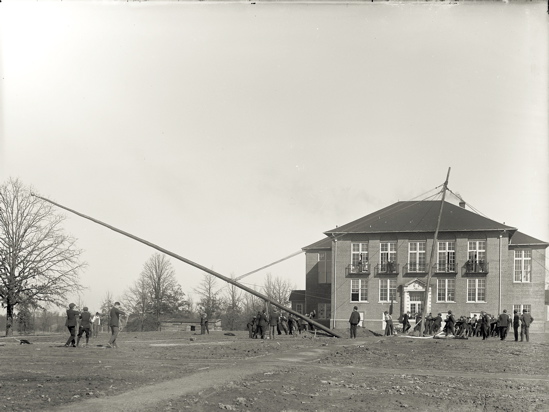TTU: The university that almost never happened
COOKEVILLE-Tennessee Tech University history professor emeritus W. Calvin Dickinson glances around his basement office in Henderson Hall, stretches back in his chair and admits something hard to believe.
TTU almost didn’t exist, here or anywhere else.
The University of Dixie, commonly called Dixie College, was founded on Nov. 18, 1909. Earlier that year, about 80 individuals signed financial pledges in amounts that ranged from $25 to $300 to establish a college to serve the people in Tennessee’s Upper Cumberland region.
Were it not for the tiny and precariously underfunded Dixie College, it’s doubtful TTU would be here.
The story of TTU’s beginnings as Dixie College is a tale of persistence. Later, as Dixie College became the state-run Tennessee Polytechnic Institute, it became a tale of political cajoling. And at a number of points along the way early on, TTU’s forerunner could have just ceased to exist.
Dixie College began as an idea. In the early 1900s, as the Church of Christ was becoming more established across the Upper Cumberland region, members of the Broad Street Church of Christ in Cookeville began exploring the notion of a school that would provide both general and Bible education.
“Cookeville had secondary schools already, so they wanted a college. One purpose would be to train and educate local people, and another one would be to train preachers,” said Dickinson, co-author of “The Search for Identity: A History of Tennessee Technological University, 1915-1985.”
About the same time, the state government passed legislation to establish “normal schools” in the state’s three grand divisions to train teachers. The mostly church-led Cookeville group placed its efforts on hold temporarily while it waited to see if Cookeville would be granted one of the three schools.
After losing out to Murfreesboro, the group in Cookeville began work again.
“They needed money of course. Two men went around the Southeast to collect money. They wanted this to be the Church of Christ school for the whole Southeast. Well, they didn’t get much and that was a big disappointment,” Dickinson said. “Also, two banks in Cookeville failed in 1909, so there was economic hardship during that period of time. It was pretty severe.”
Cookeville businessman Jeremiah “Jere” Whitson, a Broad Street Church of Christ elder, donated farmland for the college and took the lead to establish a school.
Next, they needed a name. Several names were considered, but the University of Dixie was selected to reflect the desire to serve the entire Southeast.
“That name never really caught on. But the nickname Dixie College did,” he said.
Whatever you called it – the University of Dixie or Dixie College – the school was neither a university nor a college. It was primarily a high school that operated out of temporary, rented quarters while plans for a building – what eventually became Derryberry Hall – began in 1911.
The school’s founders struggled on until 1915, unable to produce the financial sustenance needed to continue.
“By 1915 they were so discouraged that they decided the school was really not going to make it. So using all the political pull that they could generate, they persuaded the state to take over the school,” he said.
“So Dixie College didn’t really have a long life and I can’t even find if they ever graduated anybody,” Dickinson said.
Dixie College didn’t survive, but the idea that a college should be located in Cookeville did. Dixie College became Tennessee Polytechnic Institute as it was established by then-Gov. Thomas C Rye on March 27, 1915. There was quite a fight in Nashville, Dickinson says, to get the state to take over the school. Other schools in the state didn’t want to divide the funding pie further.
In 1965, the name was changed to Tennessee Tech University to reflect the institution’s expanding breadth.
Today, TTU offers 44 bachelor’s and 20 graduate degree programs within six academic divisions: Agricultural and Human Sciences, Arts and Sciences, Business, Education, Engineering, and Interdisciplinary Studies and Extended Education.
Tennessee Tech University has been named one of America’s 100 Best College Buys, earning designation several years in a row as one of the nation’s best college educations for the cost. USNews & World Report has chosen TTU as one of the Top Public Schools in the South on multiple occasions, and the university has been chosen as a “Best Southeastern College” by The Princeton Review for several years.
Find out more about TTU’s history, view photos of Dixie College’s earliest students and learn about Dixie College Day at www.tntech.edu/dixiecollege.

